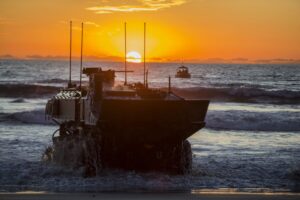The Marine Corps has placed a $153.7 million order with BAE Systems for more Amphibious Combat Vehicles (ACV), raising the cumulative value of the company’s contract for the program to $2.1 billion.
The latest production order covers 30 base personnel ACVs with deliveries to begin in 2024, a BAE Systems spokesperson told Defense Daily.

The new deal follows the Marine Corps’ decision in September authorizing ACVs to resume waterborne operations, after the force implemented a safety pause following a training incident in July at Camp Pendleton in California during which two vehicles became disabled in heavy surf. No Marines were reported injured from the incident. (Defense Daily, Sept. 23).
The decision followed an internal review and the issuing of a new interim guidance that allows ACVs to operate in open waters as long as the height of breaking waves is not above 4 feet.
“We remain steadfast to the safety of our Marines who conduct amphibious operations, and expect strict adherence to established standards that allows our ACVs to return to waterborne operations,” Lt. Gen. David Furness, deputy commandant for plans, policies and operations, said in a statement at the time. “Our training and discipline allows us to continue sharpening our warfighting abilities to remain the nation’s premier expeditionary force in readiness.”
BAE Systems has delivered more than 150 ACVs to the Marine Corps to date, according to the company spokesperson.
In August, the Marine Corps awarded BAE Systems an $88 million deal to build several of its turreted variant ACVs for testing (Defense Daily, Aug. 16).
BAE Systems said at the time that testing with the multiple ACV-30s, the version of its vehicle outfitted with a 30mm cannon, will inform the Marine Corps’ full-rate production decision for the variant.
The Marine Corps is pursuing a family of vehicles approach for ACV, which includes the base personnel platform, a recovery variant (ACV-R), a command and control platform (ACV-C) and the ACV-30.
Both the base personnel variant of the ACV and the ACV-C are now in full-rate production, with the Marine Corps having awarded BAE Systems an $89.5 million deal for delivery of 14 of the command and control vehicles in May.
In March, the Marine Corps awarded BAE Systems a $173.6 million production order for 36 more ACV base personnel vehicles and a $34.9 million deal for design and development of the ACV-R (Defense Daily, March 30).
The Marine Corps has also previously tasked BAE Systems with integrating a suite of C4/unmanned aerial system capabilities onto an ACV to study if such a platform could meet the mission requirements for the future Advanced Reconnaissance Vehicle.